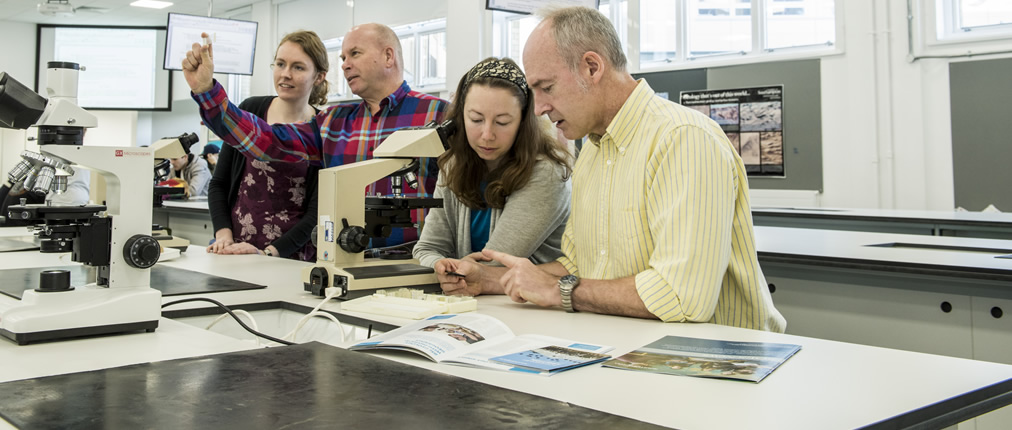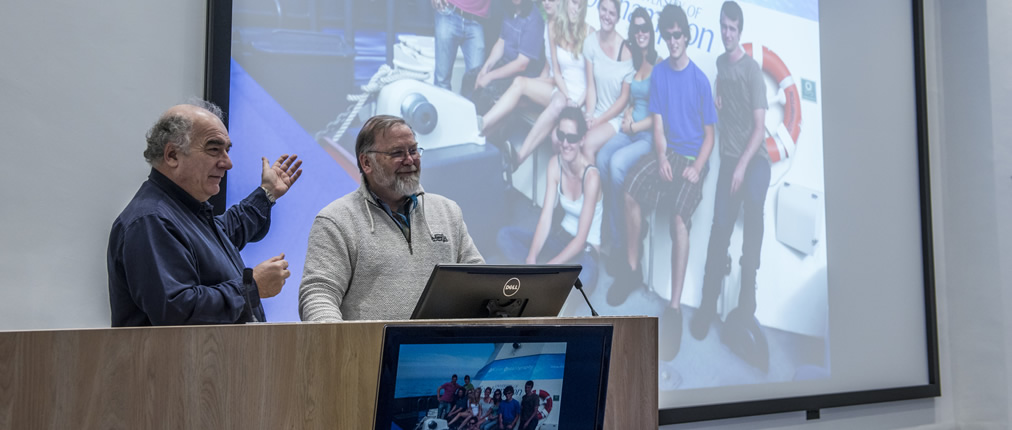Hartley News Online Your alumni and supporter magazine
Southampton Connects Staff meets the Ocean and Earth Science Admissions team, based at the National Oceanography Centre Southampton. Admissions tutors for three of the four subject areas, Dr Simon Boxall (Oceanography), Dr Ian Harding and Dr Rex Taylor (Geology) and Dr Antony Jensen (Marine Biology), talk about the importance of public engagement and their emphasis on raising the quality, as well as the quantity, of their undergraduate intake. Derek Keir – admissions tutor for Geophysics – is currently on sabbatical.
Can you describe what your team does?
IH: We work collaboratively to ensure a responsive, efficient, explanatory and courteous experience for applicants throughout each year’s UCAS admissions cycle. We aim to provide as personalised an approach as is feasible for each candidate.
SB: Our role is also to encourage people to study science and, ultimately, to come here to study oceanography, marine biology, geology or geophysics.
What does that process look like from start to finish in a typical academic year?
SB: It’s a continuous process – as we finish one year we’ve already started on the next. Our activities range from working with colleagues in communications and marketing to produce print and web recruitment materials, right through to contact with applicants. We are involved in the interview stage, we take phone calls and reply to email enquiries about the subjects and grades students need to study here. We then make offers, usually between November and March, and then we prepare for the next round. In August we make decisions about students who have narrowly missed the grades we were looking for, based on their interviews, and we also deal with clearing.
You all have very different specialisms. How do you work together as a team?
IH: We do have very different backgrounds and specialisms, but we’ve always seen this as providing strength and breadth of expertise, and we are thus able to provide whatever help and advice we can to each other on admissions matters. We all just work very well together, and know we are supported by all the other members of our team.
Why is outreach an important part of your role?
IH: Our subject areas aren’t taught in their own right in schools, so outreach is essential to let children and young people know about the opportunities that a degree in geology, geophysics, marine biology or oceanography can offer.
SB: If we can show young people what our subjects involve we will increase our student applications. That said, it’s more about quality than quantity – we want more high-quality students to apply to study here.
What opportunities do you have for outreach, and what is your target audience?
IH: Our core outreach activities are events such as the four University open days each year, the National Oceanography Centre Southampton’s Ocean and Earth Day and Science and Engineering Week activities.
SB: We also work with primary and secondary schools. This activity includes summer schools on campus, going into schools, and developing school materials for the GCSE and A level curriculum. But it’s also about public engagement and talking to the wider public; parents and relatives have a big influence on young people’s decisions about what and where to study.
IH: We have trained some of our more senior students to serve as outreach ambassadors; we feel that students returning to their former schools to give a personal perspective of their degree experience to year 12 and 13 audiences is without doubt one of the best ways to convey the opportunities our degree programmes provide.
SB: Another aspect of our engagement work involves a range of activities to popularise science and make it exciting, particularly to a young audience. These include big shows at places like the National Maritime Museum, Natural History Museum and Science Museum in London and the Museum of Science and Industry in Manchester.
We’re also involved in Cape Farewell, a cultural engagement programme that looks at the science of climate change but also the impact it has on communities. The programme invites well-known artists, writers and musicians to join scientific expeditions to the Arctic.
Involving participants such as Antony Gormley, Ian McEwan, KT Tunstall and Jarvis Cocker makes it appealing to the wider public, and the fact that we spend three or four weeks together in extreme conditions creates a strong bond.
We have already called on many of the contacts we have made through Cape Farewell including Marcus Brigstocke, for example, who did a climate change-themed comedy event at The Nuffield Theatre a few years ago.
We’ve just been involved in writing a chapter of a book called Can a Lobster be an Archaeologist? which is being produced by the Society for Underwater Technology. It targets young people of early secondary school age, looking at a range of scientific questions relating to oceanographic and marine biology subjects in an accessible way.
What have been some recent outreach successes?
AJ: I recently got involved in a Nuffield Foundation initiative for students at AS level. Through this I was able to offer a project to a young woman with a chequered educational history, and she did extremely good work which enabled her to enter our Science Foundation Year. She was able to prove that, despite her school’s expectations, she is actually very capable. She’s doing very well and I look forward to welcoming her onto our degree course next year.
SB: Our summer schools for year 10 to 12 students are an important part of our outreach work. We’ve seen the uptake increase year on year; one of our summer schools ‘sold out’ in its first two days of booking. We’re also rolling out the Inspire course, which encourages girls into science and engineering, to other departments within the University. This has been very successful and we’ve had fantastic feedback on it.
What are the most common misconceptions about your team and the work you do?
IH: For colleagues outside the team, there is probably a misconception that we just staff enquiry desks and give subject-related talks during outreach events and UCAS interview days. In fact our work covers the whole journey through the recruitment cycle. It’s not something that happens over a couple of months but is a year-round activity that has many different roles within it.
AJ: Applicants probably have more misconceptions than colleagues. For example, some students think that they can’t ask us a question because somehow we’ll remember who they are and mark them down for it. In reality, we’re very keen for people to ask us questions; we’d like people to make a decision to study with us based on information rather than guesswork.
How has your work changed since admission numbers have increased?
IH: Our policy is to make the application process as personal as possible, so we still interview all applicants before offering them a place. Thus the main pressure we have found is being able to schedule sufficient UCAS interview days to accommodate all our applicants, and as a direct consequence of this to ensure we keep staff ‘on side’ by not making undue calls on their time serving as interviewers.
What particular challenges do admissions tutors currently have?
IH: Time is always a limiting factor. With most of us having considerable teaching loads, numerous PhD students and research expectations upon us, it is difficult to spend as much time as we would all like to develop some of the ideas we have for broadening and focusing our outreach activities.
RT: Ideally it would be good to have a staff member visit as many schools as possible to raise awareness of our courses. In reality, there isn’t enough time to do this. So a potential future strategy may be to identify and target five to 10 schools that are most likely to provide us with applicants. This type of activity may be best achieved by using our current undergraduates as ambassadors to spread the word.
IH: We are also operating in an increasingly competitive higher education market for rather specialised degree subjects. There has been negative press coverage about the impact of the economic downturn on employment prospects in the mineral and hydrocarbon exploration industries; these have traditionally been the main graduate employers for geology and geophysics students. We need to get the message across that there are still many employment opportunities in other areas of our subjects, such as environmental and engineering geology or offshore surveying, and that it’s not all about oil and gas – at least not until the global economy picks up again.
SB: School education has changed quite dramatically in recent years and students aren’t as well prepared for university as they used to be. So another challenge is trying to distinguish between those students who are ready for a university education and those who, despite doing well at school, aren’t. That’s a difficult call.
Has the Vice-Chancellor’s recent announcement about the new strategy altered the expectation of your role?
SB: I think it will make our role easier. We’re looking forward to a time when there’s perhaps less bureaucracy, so that we can just get on with recruiting good students.
AJ: I think it’s really positive that there is an emphasis on increasing our intake but with a focus on high-quality students.
What do you particularly enjoy about your work?
AJ: It’s wonderful to see people right at the beginning of their career with the same enthusiasm and aspirations that I had when I was 18 and looking forward to studying marine science at university. Recently we’ve been paying more attention to students’ guests (usually their parents), and I’ve really enjoyed talking with parents because they come up with such good questions. We’ve been able to debunk a few myths and that’s been really positive.
SB: One of our aims is to encourage students from families with no experience of university; the whole process can seem a complete mystery to the parents of those students. So engaging with parents and answering their questions is almost as important as spending time with the students themselves.

